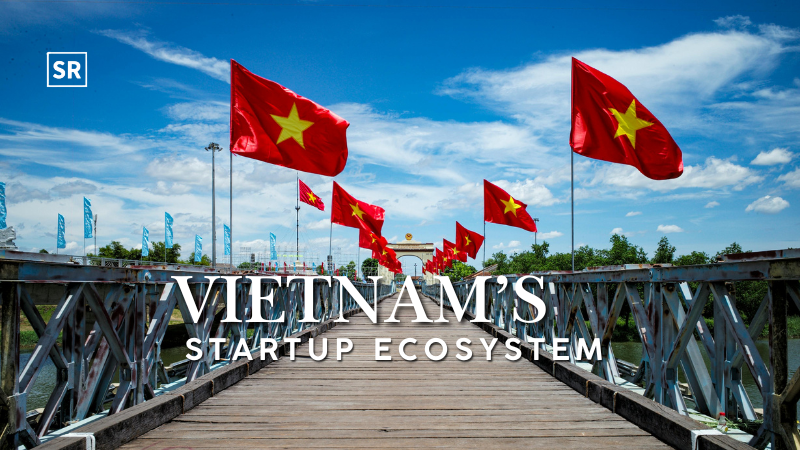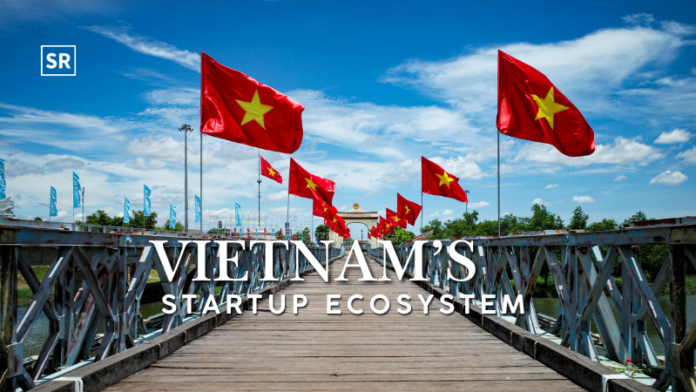
Vietnam is a long, narrow country in Southeast Asia, bordered by China to the north, Laos and Cambodia to the west, and the South China Sea to the east and south. Despite its relatively small size, the country features a diverse landscape, with lush deltas, mountains, and coastlines. The Mekong and Red Rivers, two of Vietnam’s significant waterways, both flow into the South China Sea, creating fertile land that supports the country’s strong agricultural sector. Vietnam is rich in natural resources. The country’s natural resources include minerals, coal, oil, natural gas, and an abundance of marine life, such as fish and shrimp.
Vietnam’s strategic location at the heart of Southeast Asia makes it an essential gateway to regional markets, especially with its proximity to China. The country has a population of 98.9 million. Vietnam’s startup ecosystem ranks 5th in Southeast Asia and 56th globally. It stands in 44th position in the global innovation index of 2025. This ranking reflects the country’s significant role in both the regional and global economy.
Overview of Vietnam’s Startup Ecosystem
Vietnam’s startup ecosystem has seen significant growth in recent years. The country is a rising hub for innovation in Southeast Asia. Vietnam is home to more than 3,800 startups. The government has four unicorns: VNG, VNLife, MoMo, and Sky Mavis.
The most prominent sector in Vietnam’s startup scene is Information and Communication Technology (ICT), which represents over 20% of the country’s startups. The list is followed by strong growth in fintech, e-commerce, and edtech.
Vietnam’s startup ecosystem has also been growing, with four unicorns—VNG, VNLife, MoMo, and Sky Mavis—showcasing the country’s thriving tech and fintech sectors. While the government has supported startups through various initiatives, there is a need to strengthen the ecosystem further to attract more investors and sustain long-term growth.
Government initiative to support Vietnam’s Startup Ecosystem
Vietnam’s startup ecosystem is growing thanks to several key factors. The government plays a major role by supporting innovation and entrepreneurship through funding, mentorship, and networking opportunities with programs like the National Innovation Center and Project 844.
A 2018 law to support small and medium-sized enterprises shows the government’s commitment, while tax incentives help attract foreign investors. The Ministry of Science and Technology also launched the Vietnam Silicon Valley project to provide seed funding, training, and mentorship.
Other initiatives like Build for Startups and the Google for Startups Accelerator further support local innovation by connecting startups with technology experts. Additionally, incubators and accelerators such as 2080, 5Desire, Hatch.vn, and Zone Startups Vietnam are crucial in nurturing the country’s startup growth.
Factors Contributing to the Growth of Vietnam’s Startup Ecosystem
Vietnam benefits from a highly skilled and growing tech talent pool in addition to government efforts to support startups. Vietnam strongly emphasizes STEM (Science, Technology, Engineering, and Mathematics) education. This focus on education ensures a steady supply of talented individuals ready to fuel the country’s innovation-driven economy.
Moreover the rapidly expanding economy of Vietnam offers generous opportunities for startups, mainly in high-demand sectors like e-commerce, fintech and technology. The increasing availability of co-working spaces and incubators has also provided budding entrepreneurs with affordable office space and is fostering collaboration and networking within the startup community.
Government support, a skilled workforce, a booming economy, and a growing infrastructure for startups are collectively contributing to Vietnam’s flourishing startup ecosystem.
Vietnam ranks 56th globally and 5th in Southeast Asia for its startup ecosystem, with key cities like Ho Chi Minh City and Hanoi becoming notable hubs for blockchain and fintech innovation. The country also showed a noteworthy rise in foreign direct investment, with $36.61 billion in fiscal year 2023.
Landscape for Foreign Direct Investment in Vietnam
Vietnam’s foreign direct investment (FDI) has shown strong growth in 2025. It reached $14.15 billion in the first eight months, which is an 8% increase from the previous year and the highest level in five years. The manufacturing and processing sector of Vietnam continues to attract the majority of FDI, accounting for nearly 80% of the total, followed by real estate. FDI pledges, indicating future investment, also increased by 7%, with a forecast of $40 billion in total FDI for 2025.
Singapore is the top investor in Vietnam. It is bringing in significant new projects. Other key investors like Japan, Hong Kong, Mainland China and South Korea follow the list of top investors. This increase in investment is driven by Vietnam’s attractive business environment, supportive government policies, and a strong and dynamic workforce.
Vietnam is becoming a key player in global economy despite ongoing global uncertainties. In 2023, the country attracted $36.61 billion in foreign direct investment (FDI) marking a 32.1% increase from the previous year. Vietnam’s Ho Chi Minh City and Hanoi are recognized as top global hubs for blockchain startups.
The country is a hotbed for investment in sectors like e-commerce, fintech, food tech, and IT services.
Conclusion – Vietnam’s startup ecosystem
Universities, government initiatives, and a growing digital economy strongly support Vietnam’s entrepreneurial culture. The rise of youth-led startups and initiatives like UpYouth is providing mentorship and resources for young entrepreneurs and further fueling this growth.
Vietnam’s startup ecosystem is poised for continued growth. The country is continuously working towards sector expansion and strong investment inflows. The country’s thriving talent pool, expanding middle class, and increasing digitization are further contributing to its positive outlook.
However, challenges such as regulatory hurdles, talent gaps, and a lack of significant exits still pose obstacles to further growth. Vietnam needs to implement policy reforms that ease business regulation, encourage innovation, protect intellectual property, and provide more support for incubators and accelerators.
Despite these challenges, Vietnam’s startup scene continues to thrive. It is benefiting from both local and international support and is poised to play an increasingly important role in the global economy.





